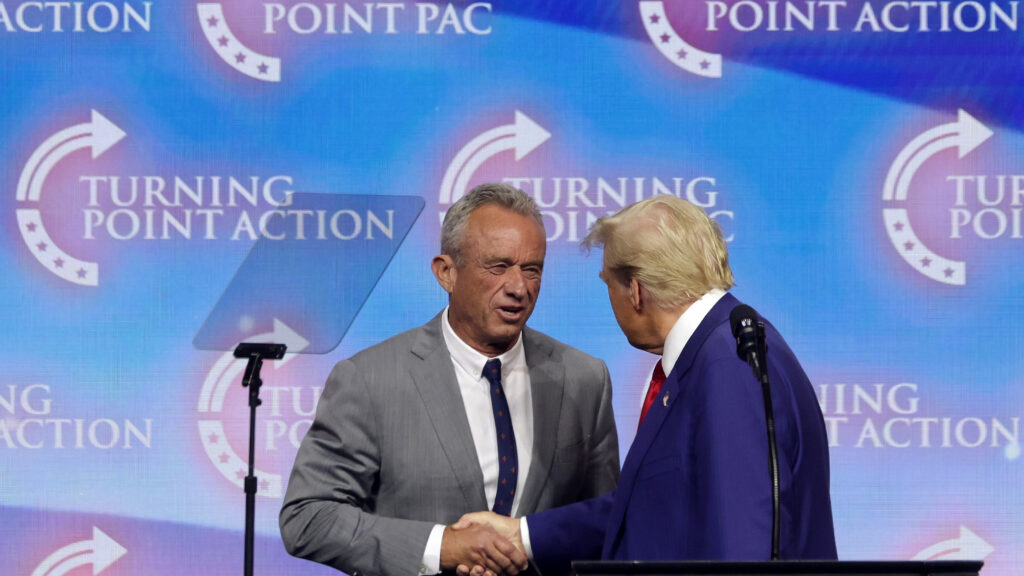You’re reading the web edition of D.C. Diagnosis, STAT’s twice-weekly newsletter about the politics and policy of health and medicine. Sign up here to receive it in your inbox on Tuesdays and Thursdays.
Hello, and happy Thursday. We’ve got a packed lineup for you this morning, and more to come. A big thanks to all the sources we’ve called and texted who have taken time in a busy news cycle to chat. News tips are welcome to [email protected].
advertisement
The MAHA characters you need to know
Christine Kao/STAT
While Robert F. Kennedy Jr. has gotten the most attention of anyone in Trumpworld for pushing the ambitious anti-chronic disease campaign “Make America Healthy Again,” he’s not pushing his agenda alone, my colleague Isabella Cueto writes.
A rotating cast of other characters — old and new; influencers, entrepreneurs, and lawmakers — has amplified Kennedy’s arguments, pushing them harder and to more people (including on the most popular podcast in the world).
She has assembled an index to introduce you to ten figures in the MAHA orbit who could be well-positioned to influence a Kennedy-driven Trump administration policy agenda on health care.
advertisement
Tell us what you really think
Pharmaceutical and biotech executives hemmed and hawed before the election about their feelings on a potential Trump administration empowering Robert F. Kennedy Jr. Now that the reality is here, our biotech and pharma reporters canvassed industry leaders for their real-time reactions.
The responses ranged from optimism, to hesitancy around “wacky appointments,” to describing Trump’s policy positions on health care as “summed up as the shrug emoji.”
They acknowledged the warring dynamics that could characterize the incoming populist Republican administration — that tax breaks and lighter oversight of mergers might be good for business, but anti-science sentiment could threaten their bottom lines. Read more here.
Abortion policy has found its ceiling
The seemingly unstoppable momentum for ballot initiatives to protect access to abortion slowed this election cycle, leaving few avenues for reproductive rights advocates to pursue, my co-author Sarah Owermohle writes.
The mixed results leave the nation a patchwork of bans, restrictions, and safe havens for abortion access. This year’s results put the nuance in Americans’ views on abortion access on full display — support erodes after the first trimester of pregnancy.
The window for taking abortion access straight to voters is narrowing, too, as only three states remain that allow voter-proposed ballot initiatives. More from Sarah.
Medicaid’s industry guardians
While health policy experts warn that President-elect Trump’s promises not to cut Medicare or Social Security could leave Medicaid vulnerable, the program’s contracts with private insurers have turned them into well-funded defenders of the program, STAT’s John Wilkerson writes.
The health care industry’s golden child, rural hospitals, could also be hurt if Medicaid is cut, John reports, because many people on Medicaid live predominantly in rural areas and small towns.
The biggest public companies to watch in this space will be Centene, Elevance, UnitedHealth Group, Molina, and CVS Health.
RFK Jr. targets the F in FDA
Big changes could be coming to the FDA under a Trump administration. On Wednesday, RFK Jr. suggested he’d fire officials in the FDA’s food division, but said he wouldn’t pull vaccines off the market. My colleague Lizzy Lawrence did a deep dive on what an empowered Kennedy could mean for the agency.
Based on his public statements, RFK Jr.’s agenda could include an effort to eliminate drug company user fees that help fund the FDA, loosening regulation of raw milk, personally reviewing data on vaccines to judge their safety, and cracking down on ultra-processed foods and food additives.
Public health experts said there’s a fine line between reforms to the agency and dismantling it entirely. Read more from Lizzy.
Justices split on multi-billion-dollar hospital lawsuit
In other Election Day news, the Supreme Court heard oral arguments in a case over a $9 billion hospital payment program, and seemed like they hadn’t unified one way or another on a ruling yet, my colleague Tara Bannow writes.
The justices’ positions didn’t necessarily follow ideological lines, as Justices Ketanji Brown Jackson and Brett Kavanaugh appeared to signal support for the hospitals. The details of the case are incredibly wonky, but with such a big price tag, it will be an important one to watch.
Hospitals in recent years have scored notable wins on payment policy at the Supreme Court, even after they fail to make their case to regulators and Congress.
Tara listened to the full argument so you don’t have to.
What we’re reading
- How will Trump’s election change the FDA? History yields some clues, STAT
- As nuns disappear, many Catholic hospitals look more like megacorporations, KFF Health News
- How your genetics could determine your politics, STAT
- Nursing homes optimistic Trump will rescind staffing mandate, Politico

